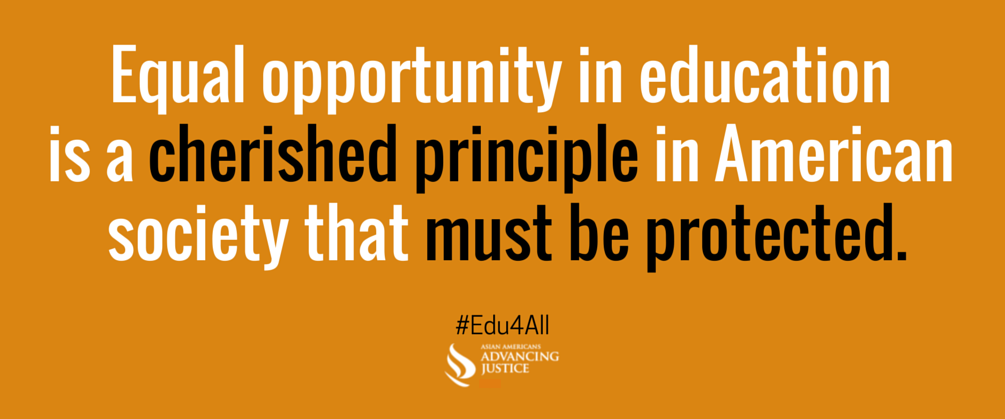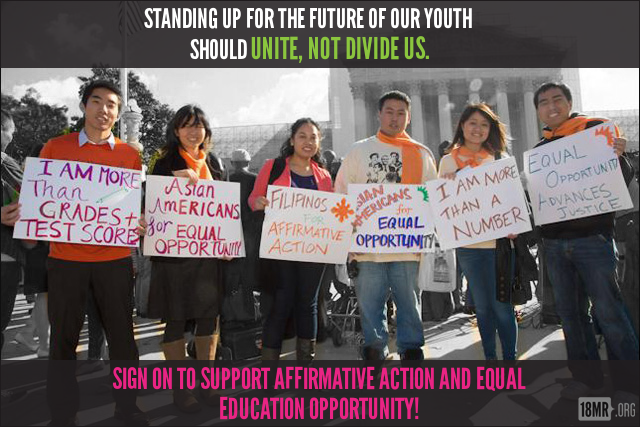Last year, California was poised to return affirmative action to the state’s institutions of higher education via a state constitutional amendment that would have reversed the devastating impact of the referendum, Proposition 209, which ended affirmative action in the state in the mid-1990’s and which had a devastating impact on underrepresented minority enrollment in California’s public university system for over a decade afterwards. The amendment to restore affirmative action in California would have passed with broad Black, Latino, and Asian American support if not for sudden, torrential political backlash emerging from within the state’s Chinese American community that in effect halted the amendment in its tracks.
This reaction was confounding in part because numerous surveys have now demonstrated that in general, more than two-thirds of the Asian American/Native Hawaiian/Pacific Islander (AANHPI) community supports affirmative action in higher education and professional sectors. This support occurs largely for two reasons: 1) many within the AANHPI community are still underrepresented on this nation’s college campuses, and 2) most AANHPI recognize the positive benefits that campus diversity efforts have historically provided and continue to provide for all students.
Yet, conservative lobbyists lost no time last year to infiltrate the vocal minority of Asian Americans who still oppose affirmative action, and those lobbyists have organized a series of new legal efforts to end affirmative action: late last year, Edward Blum — the mastermind behind Abigail Fisher’s Supreme Court case challenging the constitutionality of affirmative action — found some willing Asian American faces to launch a new series of lawsuits. This Friday, a group of over 50 Asian American organizations (which in particular still remains unknown) will hold a press conference at The National Press Club to announce their intention to file an administrative complaint to the Civil Rights Division of the Department of Justice alleging that Harvard University’s admission policies discriminates against Asian Americans.
In their press release, this group claims that their scheduled complaint filing is “the largest action taken by Asian Americans for equal college admission rights in 20 years, joined by more than 50 Chinese, Indian, Korean and Pakistani organizations all over the nation”. This quote is disconcerting for a few reasons. First of all, it suggests that this group of Asian American anti-affirmative action activists presumes to speak for the entire Asian American community despite our demonstrated popular support for (not against) affirmative action; and second that it presumes to do so while failing to represent the voices of Southeast Asian Americans or our Native Hawaiian & Pacific Islander allies.
In the last 48 hours, over 120 (and counting) groups (update: now 135+) that serve the AANHPI community around the nation have come together — along with hundreds of impassioned individuals — in a massive coalition to pen an open letter supporting affirmative action in higher education. Representing a broad cross-section of AANHPI civil rights leaders, this group reflects the AANHPI’s dedication to higher education access for all, and the important role that affirmative action programs play in educational justice.
Professor Don Nakanishi, the esteemed director emeritus of UCLA’s Asian American Studies Center, summarized the position of these 120+ organizations with his statement in reaction to Friday’s scheduled allegation that Harvard University discriminates against our community. He writes:
“I do not believe Harvard discriminates against Asian Americans or any other group of applicants. I have not seen any persuasive evidence to convince me that Harvard has a quota on Asian Americans or that it requires Asian Americans to have higher SAT scores than others who apply. I believe Asian American applicants, like others who apply, are rigorously and carefully reviewed in terms of their entire, quite comprehensive application, which includes far more than test scores and grades. I believe Harvard admits an exceptionally talented, diverse and inquisitive group of students from across the country and around the world, who contribute to and take full advantage of the university’s many academic and extracurricular pursuits and strengths.”
The full text of the open letter, which includes Reappropriate among its 120+ signatories, is below:
Asian Americans Support Affirmative Action in Higher Education
As individuals and organizations across the United States that serve and represent Asian American, Native Hawaiian and Pacific Islander (AANHPI) communities, we believe that equal opportunity is a cherished principle in American society that must be protected. Our universities should reflect our diverse democracy and expand opportunities for those students who have overcome significant barriers. Rather than letting ourselves be divided, we must come together to ensure increased opportunities and success for all students.
Affirmative action does not constitute quotas
Unfortunately, there have been attempts by some to engage in divisive wedge politics by using misguided, misleading tactics to attack equal opportunity by calling for an end to race sensitive admissions policies at educational institutions such as Harvard University and University of North Carolina at Chapel Hill. Opponents of affirmative action have wrongfully and disingenuously equated affirmative action with quotas.
The truth is that affirmative action does not constitute quotas.
Affirmative action does not exclude or limit the admission of students from any specific racial or ethnic background. Indeed, the United States Supreme Court long ago prohibited quotas in the higher education admissions process, including banning limits on the admission or enrollment of any racial or ethnic group.
To be clear, we oppose quotas, discrimination, and bias against any racial or ethnic group.
Affirmative action promotes equal opportunity for all
We support affirmative action which, as noted above, does not constitute quotas, discrimination, or bias against Asian Americans.
Currently, affirmative action at universities consists of race sensitive holistic admissions policies. These policies promote equal opportunity in a society where racism still exists and racial barriers continue to unfairly limit educational opportunities for students of color. For example, our schools are more segregated today than they were in the late 1960s. Students of color, particularly African Americans, Latinos, Native Americans, Pacific Islanders, and Southeast Asians, are much more likely to attend under-resourced K-12 schools. Implicit bias and stereotyping also further impact and harm the educational learning environments and opportunities of students of color. Universities should consider these factors when reviewing applications for admissions.
All students benefit from the racially and ethnically diverse learning environments fostered by race sensitive holistic admissions processes, including the benefits of increased cross-racial understanding, reduction of stereotyping and isolation of minority students, and training for a diverse workforce and society.
Affirmative action simply takes into account whether an applicant has overcome significant obstacles and institutional barriers, such as racial and ethnic discrimination
Affirmative action simply takes into account whether an applicant has overcome racial and ethnic adversity as one of several factors in a holistic review of an applicant’s qualifications, leadership, and potential. Holistic admissions processes also consider, for example, whether an applicant has endured poverty or is the first in her family to attend college.
Moreover, in the context of college admissions, “merit” cannot be quantified by grade point average, SAT scores, or number of activities alone. Instead, life experiences such as overcoming racial and ethnic adversity are critical factors in a student’s leadership and potential contribution to the university and to our society. In addition, numbers, like grade point averages and standardized test scores, are not colorblind and often reflect and magnify K-12 educational inequities.
Equal opportunity strengthens our democracy
Affirmative action policies help to level the playing field and promote diverse university learning environments that are essential in our multiracial and multicultural society. Our democracy benefits from a diverse and educated populace and workforce.
Those who are truly committed to equal educational opportunity should demonstrate real leadership and reinvest in higher education throughout the nation to expand access, affordability, equity, and student success. Decades of disinvestment in higher education across the country have made college less accessible for all students, especially students of color. We call for unity in standing up for the future of our youth and realizing the promise of equal opportunity for all in the United States.
Click here to see the organizations supporting this statement
To dismantle some of the myths surrounding affirmative action and student diversity — and specifically the spurious charge that affirmative action constitutes some sort of discriminatory anti-Asian quota (it does not) — please check out my (pretty abundant) writing on this topic. To learn more about the efforts of this coalition of 120+ AANHPI organizations to draw attention to our community’s support of affirmative action, please check out AsianAmericanCivilRights.org.
To add your own name, or the name of your organization, to the open letter, please visit this link.
Update: There are now 135+ AANHPI groups to have added their names to this open letter. A translated version of the open letter is now available in Chinese.


